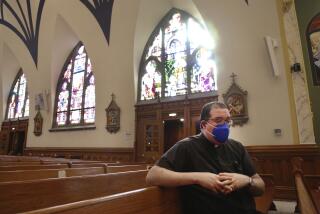Religion Isn’t Curbing Materialism, Poll Says : Study: Worship is being used to salve consciences, not to challenge people to examine their lifestyles, survey finds.
- Share via
Four in five working Americans say selfishness and the condition of the poor are serious national problems. But ask them what they consider important in life, and the same number say having a beautiful home, a new car and other nice things.
These are among the findings of a new national study on work, money and religion that reveals a desire of many Americans to lead simpler, gentler lifestyles even as they find themselves caught in the rat race.
Religion does appear to help individuals lead more ethical lives in the marketplace, but sociologist Robert Wuthnow also found substantial evidence that many people are turning to churches and synagogues more to salve their consciences than challenge them.
“We live in a materialistic culture, and we want money and possessions, and very few people have heard a powerful voice telling them to resist those impulses, or how to resist those impulses,” said Wuthnow, who reports the study findings in his new book, “God and Mammon in America,” being published by the Free Press.
“The point is the clergy need to be speaking more forthrightly and boldly on these issues.”
The national Gallup survey of 2,013 working adults in 1992 was part of a five-year project Wuthnow directed on religious and economic beliefs and values. The data was supplemented by more than 175 in-depth interviews with people in a range of jobs throughout the country.
Many respondents criticized society’s emphasis on pursuing material wealth. Ninety-two percent said the condition of the poor is a serious social problem, while 81% said selfishness is a serious problem. Three-quarters of the respondents said there is “too much emphasis on money” in the United States.
Brought down to a personal level, however, 80% said having a beautiful home, a new car and other nice things was absolutely essential, very important or fairly important to them. Three out of four respondents said wearing nice clothes was important.
And organized religion, which tends to treat money like sex when it comes to taboo topics in the sanctuary, has not done a good job of challenging people to examine their lifestyles, according to the study.
For example, when asked whether their choice of jobs was influenced by religion, 75% said no, 12% said maybe and only 10% said religious values definitely influenced their decision. The No. 1 reason people chose their present line of work: the money.
When it comes to how people allocate their treasure on Earth, Wuthnow found in interviews that religion is merely a therapeutic device to make people feel good about themselves. In their own lives, respondents reported considering themselves anxious about their personal needs no matter how far they were up on the economic ladder. One worker interviewed in the book said she earns a six-figure income but that it would take at least $50,000 more a year for her to live comfortably.
When religion is taken seriously, it influences people in all areas, from business ethics to their concern for the poor, the study found.
Respondents who said religion was very important to them were consistently less likely than respondents who said religion was not very important to have bent the rules in dealing with others or to take time off from work that was not due them.
Thirty-nine percent of weekly churchgoers said they were involved in charity or social service activities, compared with one-quarter of all respondents.
Only 7% of church members said they would be more likely to give money to a church that emphasizes giving money more than it does now, while 65% said they would be more likely to give money if the church was doing more to help the needy.
In personal interviews reported in the book, several people said their faith helped reinforce alternative values to the secular culture. One woman left a high-stakes political career to become a social worker, while other women sacrificed careers for a time to raise their children at home. One couple significantly reduced their consumer spending to help refugees.
“The point isn’t that we are all just strapped,” said Wuthnow, director of the Center for the Study of American Religion at Princeton University. “It’s a matter of making moral choices of how we use our resources.”
More to Read
Sign up for Essential California
The most important California stories and recommendations in your inbox every morning.
You may occasionally receive promotional content from the Los Angeles Times.













